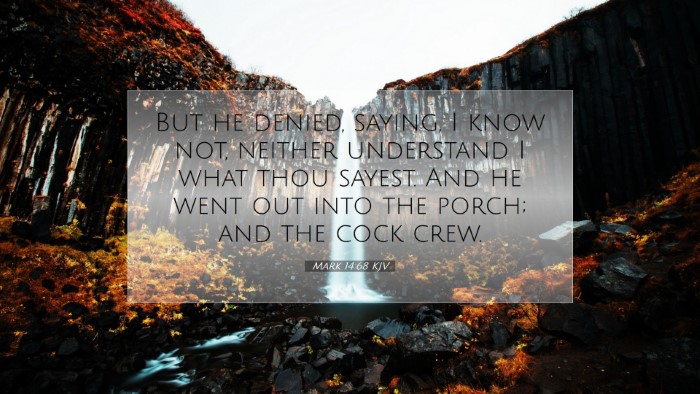Commentary on Mark 14:68
Mark 14:68 presents a significant moment in the narrative of the Gospel, capturing Peter’s denial of Christ
during His trial. The verse reads: "But he denied it, saying, I know not, neither understand I what thou
sayest. And he went out into the palace, and the cock crew."
This moment is pivotal in understanding both Peter's character and the profound weight of Jesus' suffering
and impending crucifixion. The diverse insights gleaned from esteemed public domain commentaries provide depth
to this passage, allowing us to explore its theological and practical implications.
Contextual Overview
The context of this verse finds Peter following Jesus after His arrest, a contrast to the other disciples
who had fled. Here, we see his willingness to stay close, albeit at a distance. This moment serves as a
crucial turning point not only for Peter but for the narrative of the Passion itself.
Insights from Matthew Henry
According to Matthew Henry, Peter's failure echoes the frailty of human nature. In his thoughts, Henry
emphasizes the importance of vigilance in faith, suggesting that even the most fervent disciples can fall
prey to fear and confusion when faced with trial:
-
The Danger of Presumption: Henry asserts that Peter's confidence led him into danger.
It serves as a reminder that self-reliance may often precede a fall.
-
The Natural Reaction: When confronted by challenges, it is common to deny or retreat;
Peter's actions underline this instinctive response.
-
The Fulfillment of Prophecy: Henry notes that Peter’s denial fulfills Jesus’s
prophetic statement that ‘before the cock crows twice, you will deny Me three times’ (Mark 14:30).
Insights from Albert Barnes
Albert Barnes provides a thorough exegesis of Mark 14:68, focusing on the significance of Peter's denial in
a broader theological framework:
-
The Complex Nature of Denial: Barnes elaborates on Peter’s statement, articulating a
deep moral and spiritual struggle. He highlights that this denial was not a simple act of cowardice but a
complex interplay of fear and the desire for self-preservation.
-
The Role of the Servant Girl: The mention of the maidservant who questions Peter is
significant. This not only exemplifies the pressure of public scrutiny but symbolizes the profound
questions of loyalty faced in times of crisis.
-
The Chicken's Crow: The crowing of the cock serves as a salient reminder of guilt and
foreboding. Barnes interprets this as a wake-up call to spiritual alertness, urging believers to remain
aware of their convictions.
Insights from Adam Clarke
Adam Clarke offers a more intricate theological perspective on this verse, connecting it to the broader
themes of redemption and restoration:
-
A Heart Reflective of Weakness: Clarke posits that Peter’s response, "I know not,"
reveals the deep underlying fear that often leads to denial of faith. It underscores the necessity for
genuine commitment.
-
Symbolic Actions: Clarke emphasizes the symbolic nature of Peter’s exit into the
courtyard. This signifies not just physical relocation but a spiritual retreat, highlighting the
consequences of distancing oneself from the light of Christ.
-
Path to Restoration: Clarke ultimately draws attention to Peter's later restoration,
framing this denial as part of a divine plan that leads to profound growth and humility.
Theological Reflections
The failed declaration by Peter reflects on the human struggle with sin and the temptation to renounce faith
under pressure. It allows theologians and scholars to explore the vast themes of grace, redemption, and the
nature of belief:
-
The Universality of Denial: Peter's experience resonates with believers today,
furnishing lessons about the ease of denial in our own lives when faced with societal pressures or
personal fears.
-
The Assurance of Restoration: The trajectory of Peter's journey is vital for understanding
the nature of God’s grace, showcasing that despite our failures, restoration is always possible through
genuine repentance and humility.
-
The Importance of Community: The narrative also prompts reflection on the necessity of
supportive Christian fellowship, encouraging believers to hold one another accountable in their walk of faith
(Galatians 6:1).
Practical Applications
For pastors, students, and scholars, Mark 14:68 serves as an essential reminder to remain transparent and vigilant in faith:
-
Encouragement for Vigilance: Regular prayer and engagement with scripture fortify one's
faith against the trials and temptations of daily life.
-
Emphasis on Accountability: Foster an environment within church communities where members
can express struggles and seek prayer without fear of judgment.
-
Modeling Grace: Encourage understanding that failure can be addressed with grace and leads to
deeper relationships with God and others.
Conclusion
Mark 14:68 stands as a point of profound significance within the Gospel narrative, embodying the tension
between faithfulness and fear. Through the insights provided by treasured commentators like Matthew Henry,
Albert Barnes, and Adam Clarke, we garner a richer understanding of Peter’s human frailty. More importantly,
it invites all believers into a deeper reflection on their own commitments and the grace offered through
Christ even amidst failure.


